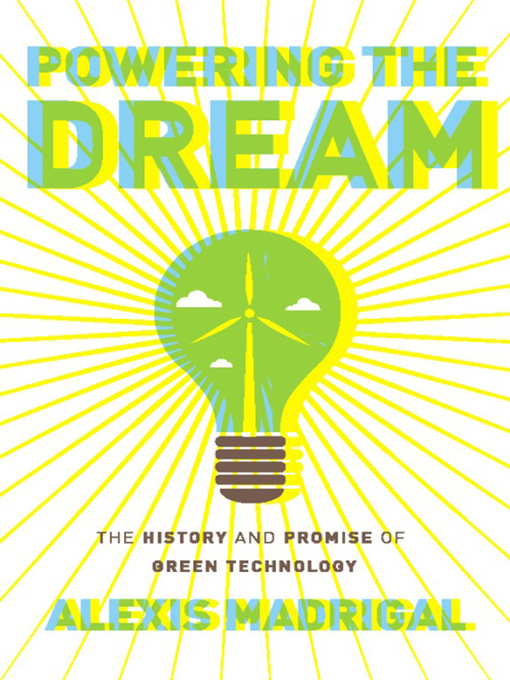In other words: We've been here before. Although we may have failed, America has had the chance to put our world on a more sustainable path. Americans have, in fact, been inventing green for more than a century.
Half compendium of lost opportunities, half hopeful look toward the future, Powering the Dream tells the stories of the brilliant, often irascible inventors who foresaw our current problems, tried to invent cheap and energy renewable solutions, and drew the blueprint for a green future.
-
Creators
-
Publisher
-
Release date
March 29, 2011 -
Formats
-
Kindle Book
-
OverDrive Read
- ISBN: 9780306819773
-
EPUB ebook
- ISBN: 9780306819773
- File size: 489 KB
-
-
Languages
- English
-
Reviews
-
Library Journal
March 15, 2011
Madrigal (former staff writer, Wired.com; senior editor and reporter, TheAtlantic.com) offers a volume that is part history of America's use of green technologies, part history of our relationship with that technology, and part hope for the future. As a history of individual technologies, the book details our nation's brief forays into the use of wind, wave, and solar energy, exploring, for example, the use of DIY windmills in the 19th-century American West. As a history of green technology in America, it highlights the stories of people who placed more value on making the world a better place for humans--on developing clean, safe energy alternatives--than on preserving some pristine state of nature. And as hope for the future, it presents the stories of those working to improve society in a way private enterprise seems unable to do. VERDICT On all these counts, the book is successful, although serious historians of technology or American environmentalism will find it lacking in detail and analysis. Recommended for general readers with an interest in America's past, present, and future relationship with green technology.--Jon Bodnar, Emory Univ. Lib., Atlanta
Copyright 2011 Library Journal, LLC Used with permission.
-
Kirkus
March 1, 2011
Eye-opening micro-histories about American energy past, with an eye to the future, from Atlantic senior editor and technology writer Madrigal.
The author presents a host of good ideas and missed chances in the history of energy production, many of which were in the realm of renewal/sustainable. Madrigal seeks to understand why certain choices were made. For example, at the turn of the 20th century, electric and gasoline-powered automobiles were vying for market dominance. Gasoline won out because it fit snugly with the public attitude for autonomy, set in gear by the massive popularity of the bicycle, which "laid the cultural, infrastructural, and legal groundwork for the privately owned, gasoline-powered vehicle's dominance." It got people wanting to travel where they pleased on their own schedule, and the network of bike-repair shops became auto-repair shops. Madrigal covers a dozen other energy schemes with the thoroughness of a convert to each--why the wave motor, windmills, compressed-air systems and solar homes burned brightly for only a short while, but also (and this is critical) why they are now ripe for rediscovery. The author provides vest-pocket biographies of energy mavens, including Palmer Putnam and his giant windmill and physicists like Arthur Rosenfeld, who "broke the psychological link that generations had made between increased levels of fossil-fuel use and economic growth." Madrigal also offers a digestible course on the economics of renewable energy, and he raises the red flag of such environmentalists as Kim Delfino of the Defenders of Wildlife: "California is starting to see a new kind of 'gold rush, ' but this time it is going to be our wind, sunlight and public lands public lands that are up for grabs"--another government-to-corporate giveaway.
A well-told cautionary tale about the need for widespread renewable-energy production.
(COPYRIGHT (2011) KIRKUS REVIEWS/NIELSEN BUSINESS MEDIA, INC. ALL RIGHTS RESERVED.)
-
Booklist
April 1, 2011
Technology journalist Madrigal rises above politics to review the surprisingly long and fruitful history of renewable energy in the U.S. From the water-powered turbines of the Lowell factories to windmills dotting the Great Plains in the mid-nineteenth century, he makes it clear that Americans were eager to utilize green power from the earliest days of industrialization. Readers will likely be startled by hopeful early-twentieth-century declarations that Pacific Ocean wave motors would render Los Angeles a smokeless and sootless city. While the motors were a failure at the time, the enthusiasm for their success is echoed in the current use of tidal power. From modern-day transcendentalists to suburban solar homes of the Ozzie-and-Harriet era, Madrigal disproves any notion that an energy-conscious attitude is a twenty-first-century invention. Rather, it is one that has been as much a part of our national fabric as the frontier ideal itself. He shows beyond a doubt that the past will lead the way to a greener future, one that nods to Thoreau while embracing the tools to finally make green technology a real success.(Reprinted with permission of Booklist, copyright 2011, American Library Association.)
-
Formats
- Kindle Book
- OverDrive Read
- EPUB ebook
subjects
Languages
- English
Loading
Why is availability limited?
×Availability can change throughout the month based on the library's budget. You can still place a hold on the title, and your hold will be automatically filled as soon as the title is available again.
The Kindle Book format for this title is not supported on:
×Read-along ebook
×The OverDrive Read format of this ebook has professional narration that plays while you read in your browser. Learn more here.



